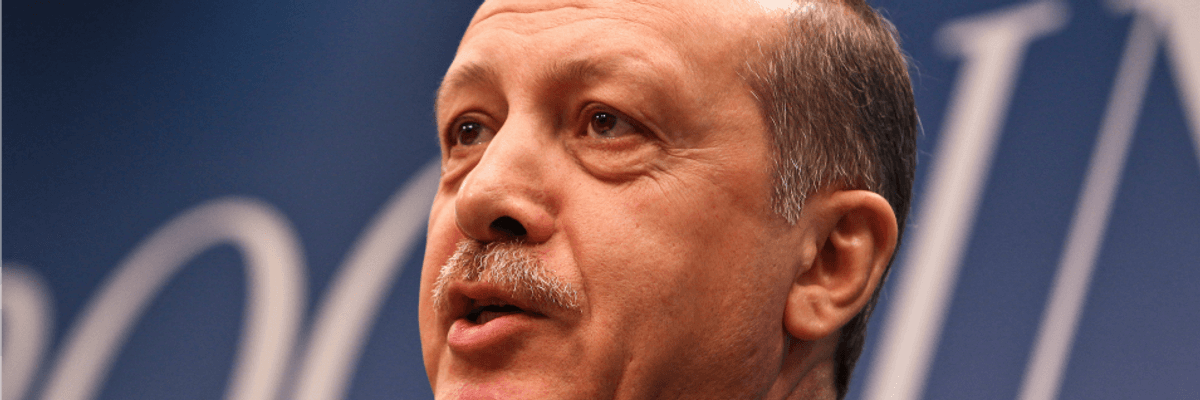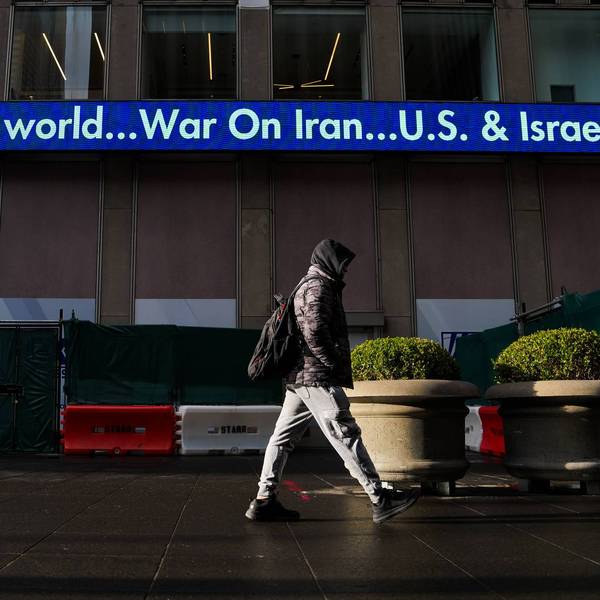
Turkish President threatened last week to retaliate against the United States' support for Kurdish forces in northern Syria, as the U.S. announced a plan for open-ended involvement in the country. (Photo: Brookings Institution/Flickr/cc)
As Washington Inflames Tensions in Syria, Turkey Launches Airstrikes Against U.S.-Backed Kurdish Forces
More than 100 targets were bombed Saturday, days after Turkey threatened attacks unless U.S. withdrew support for Kurdish forces
Trump critics this weekend tied the administration's decision to continue U.S. military presence in Syria to Turkey's aggressive bombing of U.S.-backed Kurdish forces in the country's northern region.
Dozens of Turkish jets bombed more than 100 targets on Saturday as members of the Turkish-backed Free Syrian Army crossed into the Kurdish-controlled area of Afrin and fought militias there. At least eight people were killed.
The fighting came days after Turkish President Recep Tayyip Erdogan accused the U.S., Turkey's NATO ally, of "insisting on forming a terror army on our borders" in response to the Trump administration's plan to arm and train 30,000 Kurdish forces.
"Our mission is to strangle it before it's even born," Erdogan warned last week.
The Department of Defense said Wednesday that the decision to back the Kurdish "Border Security Force" would "enhance security for displaced persons returning to their devastated communities" and keep ISIS from reemerging in the region.
The State Department denied this week that the U.S. was supporting a Border Security Force. But Secretary of State Rex Tillerson's insistence that the plan has been "misportrayed" did not stop Turkey from waging an attack on what Turkish officials called an "illegitimate foreign presence."
Brooklyn College professor Louis Fishman, who writes on Turkish and Middle Eastern affairs, said the Turkish offensive exposed the U.S. policy of "open-ended" presence in Syria, with an estimated 2,000 Americans stationed there, as poorly planned and dangerous.
An Urgent Message From Our Co-Founder
Dear Common Dreams reader, The U.S. is on a fast track to authoritarianism like nothing I've ever seen. Meanwhile, corporate news outlets are utterly capitulating to Trump, twisting their coverage to avoid drawing his ire while lining up to stuff cash in his pockets. That's why I believe that Common Dreams is doing the best and most consequential reporting that we've ever done. Our small but mighty team is a progressive reporting powerhouse, covering the news every day that the corporate media never will. Our mission has always been simple: To inform. To inspire. And to ignite change for the common good. Now here's the key piece that I want all our readers to understand: None of this would be possible without your financial support. That's not just some fundraising cliche. It's the absolute and literal truth. We don't accept corporate advertising and never will. We don't have a paywall because we don't think people should be blocked from critical news based on their ability to pay. Everything we do is funded by the donations of readers like you. Will you donate now to help power the nonprofit, independent reporting of Common Dreams? Thank you for being a vital member of our community. Together, we can keep independent journalism alive when it’s needed most. - Craig Brown, Co-founder |
Trump critics this weekend tied the administration's decision to continue U.S. military presence in Syria to Turkey's aggressive bombing of U.S.-backed Kurdish forces in the country's northern region.
Dozens of Turkish jets bombed more than 100 targets on Saturday as members of the Turkish-backed Free Syrian Army crossed into the Kurdish-controlled area of Afrin and fought militias there. At least eight people were killed.
The fighting came days after Turkish President Recep Tayyip Erdogan accused the U.S., Turkey's NATO ally, of "insisting on forming a terror army on our borders" in response to the Trump administration's plan to arm and train 30,000 Kurdish forces.
"Our mission is to strangle it before it's even born," Erdogan warned last week.
The Department of Defense said Wednesday that the decision to back the Kurdish "Border Security Force" would "enhance security for displaced persons returning to their devastated communities" and keep ISIS from reemerging in the region.
The State Department denied this week that the U.S. was supporting a Border Security Force. But Secretary of State Rex Tillerson's insistence that the plan has been "misportrayed" did not stop Turkey from waging an attack on what Turkish officials called an "illegitimate foreign presence."
Brooklyn College professor Louis Fishman, who writes on Turkish and Middle Eastern affairs, said the Turkish offensive exposed the U.S. policy of "open-ended" presence in Syria, with an estimated 2,000 Americans stationed there, as poorly planned and dangerous.
Trump critics this weekend tied the administration's decision to continue U.S. military presence in Syria to Turkey's aggressive bombing of U.S.-backed Kurdish forces in the country's northern region.
Dozens of Turkish jets bombed more than 100 targets on Saturday as members of the Turkish-backed Free Syrian Army crossed into the Kurdish-controlled area of Afrin and fought militias there. At least eight people were killed.
The fighting came days after Turkish President Recep Tayyip Erdogan accused the U.S., Turkey's NATO ally, of "insisting on forming a terror army on our borders" in response to the Trump administration's plan to arm and train 30,000 Kurdish forces.
"Our mission is to strangle it before it's even born," Erdogan warned last week.
The Department of Defense said Wednesday that the decision to back the Kurdish "Border Security Force" would "enhance security for displaced persons returning to their devastated communities" and keep ISIS from reemerging in the region.
The State Department denied this week that the U.S. was supporting a Border Security Force. But Secretary of State Rex Tillerson's insistence that the plan has been "misportrayed" did not stop Turkey from waging an attack on what Turkish officials called an "illegitimate foreign presence."
Brooklyn College professor Louis Fishman, who writes on Turkish and Middle Eastern affairs, said the Turkish offensive exposed the U.S. policy of "open-ended" presence in Syria, with an estimated 2,000 Americans stationed there, as poorly planned and dangerous.

